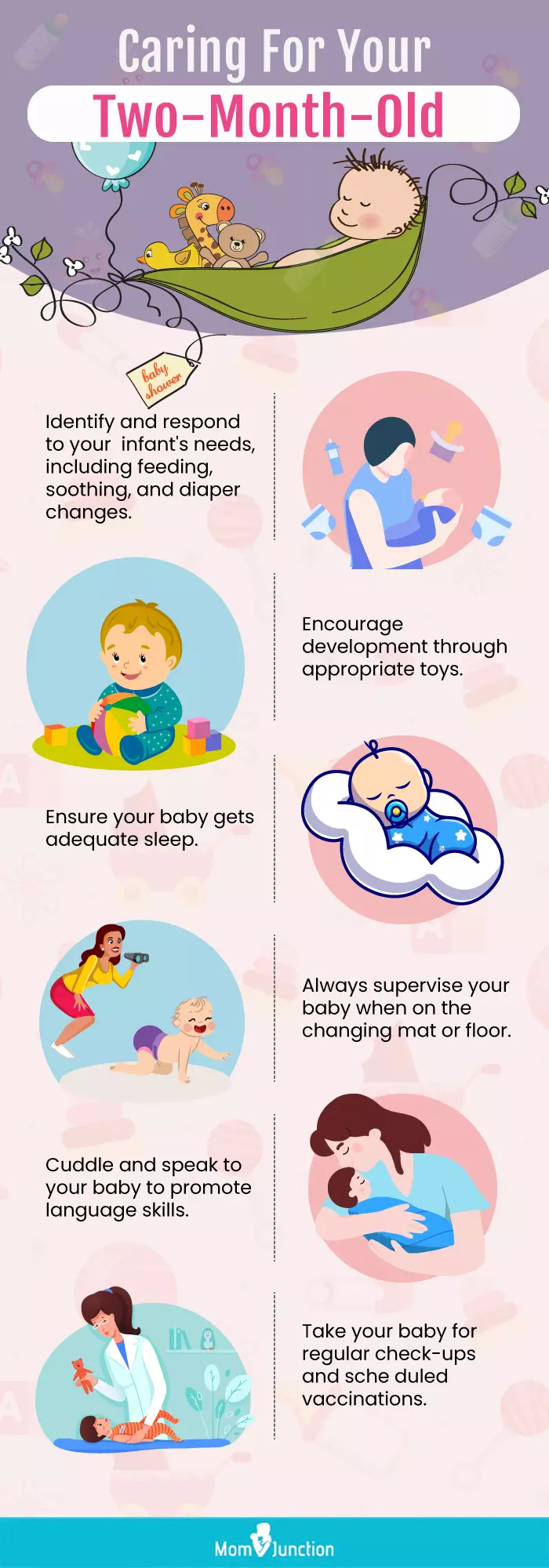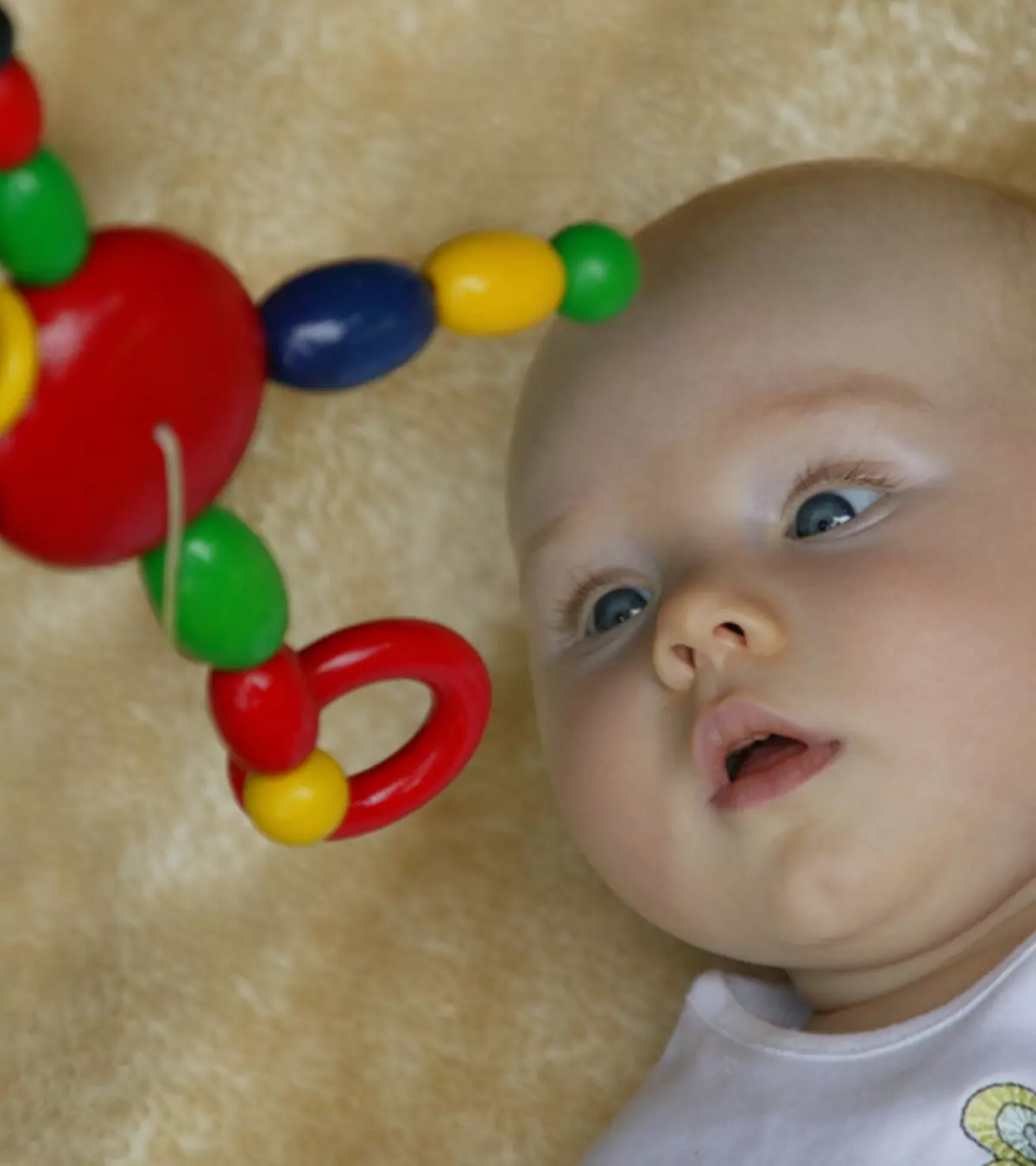
Image: ShutterStock
As babies grow, you need to keep adapting to their development. For example, at two months, babies may start responding to sounds, recognize voices, seem interested in their hands and feet, try to grab objects, and make cooing or gurgling sounds. These adorable developmental milestones may want you to know more about effective ways of 2 months baby care to ensure their safety and all-round growth. In addition, babies usually need to be fed more frequently, sleep longer, and cry more at this age. Therefore, you need to identify these growth phases and avoid being extra worried for your little one. In this post, we share a list of useful tips to help you take good care of your 2-month-old.
Key Pointers
- The first and most important step in taking care of a 2-month-old baby is to update their feeding requirements.
- Along with maintaining a proper diet, it is essential to keep them well hydrated and ensure they get ample rest.
- Keeping the baby clean and active is crucial to promote physical and mental development.
- Regular checkups with their doctor are necessary to ensure the child’s development is on track.
Essential Care Tips For Your 2-Month-Old Baby
1. Fulfill Increased Feeding Requirements:

At 2 months, babies usually require 4-5 ounces of breast milk or formula per feeding every 3-4 hours. Your two-month-old baby may exhibit increasing signs of appetite and demand feedings often. Usually, infants cry when they are hungry. Try to identify their needs and feed them whenever you find them crying. If you have been breastfeeding and have been offering breast milk of only one breast, you may need to start offering both breasts to feed your infant. If bottle feeding, be sure to choose a formula that is appropriate for your baby’s age and needs, and always follow safe preparation and feeding practices. Your baby may also demand to feed even at night or midnight. Burping your baby after every feed can help prevent discomfort from gas and reduce the risk of colic (17).
 Point to consider
Point to consider2. Identify And Take Care Of Sleeping Times:
In the second month, infants tend to develop longer sleep periods. Watch the sleeping patterns of your growing infant. Your baby can sleep anywhere between one to three hours during the day. Also, your two-month-old may exhibit tired signs at the end of their feeds or a half an hour after their feed. Swaddling can help soothe a fussy or overstimulated baby and promote sleep, but be sure to follow safe sleep guidelines and never cover your baby’s face or restrict their movement. A total of nine to twelve hours of sleep in 24 hours is normal for a two-month-old infant. So make sure your infant gets adequate sleep (1).
3. Attend To Your Baby When She Cries:
Two-month-old babies cry a lot, which can be distressing for you. Infants cry in the second month as the nervous system tends to mature, excitement due to stimulus, overtiredness, and attention. Taking time to bond with your baby through skin-to-skin contact, talking, and cuddling can have numerous benefits for both parent and child, including improved mental health and attachment (18). So, whenever your baby cries, attend to your baby and give her all your attention. Cuddle her, soothe her, or take her outside to calm her. This is how you can do for a two month baby care (2).
 Quick Tip
Quick Tip4. Encourage Your Baby’s Development:
A two-month-old tends to develop better vision and grip and show better hand and feet movements. Your baby discovers their hands and feet and keeps them moving in the air. Therefore, you can try some 2-month-old baby activities to encourage their development. You can tie wrist rattles on your baby’s wrists and let them gaze at the color and sound of the rattle. Vision development occurs in the initial months of birth, and you can encourage it with the help of colorful objects and soft toys (3).
5. Interact With Her:

One of your 2-month-old’s milestones includes being responsive to loud and sudden noises. Watch her coo and throw her hands around on hearing a loud noise. Talk with your dear little one. Speak simple words or rhyming words so that your baby will recognize them and respond to them (4).
Amber Marie Massey, a mother of three, talks about how her two-month-old baby boy is very social and loves interacting with everyone. She mentions, “This boy!! His little personality has exploded over the last month! Giant smiles, the happiest eyes, and he’s this close to letting out a little chuckle. He coos so loudly and screeches in excitement- he loves to be talked to, and the moment he locks eyes with you, the smiles start. Seriously, my most social baby ever (i).”
 Be watchful
Be watchful6. Keep Your Baby Safe:
Never leave your baby on her change mat or the floor without any supervision. If you have pets at home, keep your baby away from them. Make sure your baby has soft toys, which don’t have any sharp edges. Scan the place around your baby to ensure there are no sharp and harmful objects lying around (5). Don’t forget to follow a recommended vaccination schedule that can help protect your baby from serious illnesses. If your baby shows signs of allergy or intolerance to certain foods or substances, talk to your pediatrician.
7. Keep A Track Of Immunizations And Overall Health:

According to the Centers for Disease Control and Prevention, immunization rates were found to be 81% among infants around the globe. Make sure you get your little one appropriately vaccinated. Ensure to follow the recommended vaccination schedule from your pediatrician. Vaccinations are crucial for protecting your baby against serious illnesses and should be kept up to date, including the first doses of DTaP and IPV vaccines. Take your baby to the doctor for regular health check-ups. Also, maintain clean and tidy surroundings so your baby won’t get infected. Your infant’s hygiene should be a priority (6).
Frequently Asked Questions
1. What does a 2 month old baby need?
The basic food and sleep requirements of a 2 month old baby are (7) (8):
- They usually require 4 to 5 ounces per feed, repeated every 3 to 4 hours.
- They need to sleep around 15 hours a day, distributed as about 9 hours of nighttime sleep and 6 hours of daytime naps.
2. Does a 2-month-old baby recognize her mother?
Yes, a 2-month old baby may recognize her mother as babies learn that faces and voices go together by 2 to 3 months of age (9).
3. What can my 2 month old baby do?
By 2 months babies have discovered hands and feet and show smoother movements. They may hold or grab different objects and may even roll over. Babies develop more muscle control around this time and may try to lift their head and chest during tummy time. Their eyes will follow you when you talk to them and smile. They will seem interested in colorful and patterned objects. They may try talking back to you with sounds such as gurgling and ‘a’ or ‘o’ (10)
4. What is the weight of a 2-month-old baby?
The average body weight of a 2-month-old baby boy is about 5.6 kilograms (12.3 pounds), and that of a 2-month-old baby girl is about 5.2 kilograms (11.4 pounds) (11). However, these values may vary depending on the birth weight, so discuss with your doctor.
5. What are the signs of illness in a two-month-old baby?
Illness in a two-month-old baby can bring about behavioral changes, such as decreased appetite, changes in sleeping patterns, lethargy, and irritability. It may be accompanied by fever, coughing, vomiting, diarrhea, breathing difficulties, ear infections, and a rash (12). A healthcare professional should promptly address any signs or symptoms of illness.
6. Which foods should a two-month-old baby avoid?
Do not give any solid food to a two-month-old baby. Breast milk or formula should be the sole source of nutrition for the baby at this age. Solid food shouldn’t be started for babies younger than four months (13).
7. How much formula should a two-month-old baby be consuming each day?
A two-month-old baby should ideally consume around five to six ounces of formula per feeding, spread out over five to six feedings (13).
8. What is the best way to help a two-month-old baby develop strong neck muscles?
Tummy time is one of the best ways to help a two-month-old baby develop strong neck muscles. Placing the baby on their tummy for short periods of supervised playtime several times a day can help them build the strength to lift their head and develop their neck muscles (14).
9. What is the recommended amount of tummy time for a two-month-old baby?
A two-month-old baby should aim for at least 20 minutes of tummy time per day, spread out over multiple short periods (15).
10. How often should a two-month-old baby be bathed?
A two-month-old baby does not need to be bathed daily. Two to three times per week are typically sufficient, using warm water and mild baby soap (16).
11. How should a two-month-old baby be handled to prevent overstimulation?
A two-month-old baby should be handled gently and calmly to prevent overstimulation. Limiting noise and light stimuli, avoiding too much physical activity, and providing a quiet, soothing environment may help prevent overstimulation.
Now that your baby is 2 months old, you may finally be able to predict their feeding and eating pattern. Further, your breastmilk supply may have adjusted to their needs. Also, now that your baby has begun responding to your call, you should interact more with them. 2-month baby care also includes ensuring their proper hygiene and safety so that they do not fall ill. Further, check with your pediatrician about their vaccination schedule and get them immunized on time to prevent diseases.
Infographic: 2-Month Baby Care Tips
As your little one touches their two-month mark, providing a stimulating environment through talking, singing, and playing is vital besides taking care of their essential needs. Scroll through this infographic to learn how to take care of your two-month-old. Also, monitor your infant’s development and provide appropriate supervision and support when needed. Illustration: Momjunction Design Team
Illustration: 2 Month Baby Care - 7 Useful Tips To Follow

Image: Stable Diffusion/MomJunction Design Team
Personal Experience: Source
MomJunction articles include first-hand experiences to provide you with better insights through real-life narratives. Here are the sources of personal accounts referenced in this article.
i. Brady Jordan | 2 monthshttps://themasseyspot.blogspot.com/2017/05/brady-jordan-2-months.html
References
- Sleep in Infants (2-12 Months)
https://www.nationwidechildrens.org/specialties/sleep-disorder-center/sleep-in-infants - Excessive crying in infants.
https://medlineplus.gov/ency/article/003023.htm - Important Milestones: Your Baby By Two Months
https://www.cdc.gov/ncbddd/actearly/milestones/milestones-2mo.html - Developmental milestones record – 2 months
https://medlineplus.gov/ency/article/002006.htm - Babies and safety
https://www.betterhealth.vic.gov.au/health/healthyliving/babies-and-safety - Vaccine Recommendations for Infants & Children
https://wwwnc.cdc.gov/travel/yellowbook/2024/family/vaccine-recommendations-for-infants-and-children - How Often and How Much Should Your Baby Eat?.
https://www.healthychildren.org/English/ages-stages/baby/feeding-nutrition/Pages/How-Often-and-How-Much-Should-Your-Baby-Eat.aspx - Infant Sleep.
https://www.stanfordchildrens.org/en/topic/default?id=infant-sleep-90-P02237 - 2-3 months: newborn development.
https://raisingchildren.net.au/newborns/development/development-tracker/2-3-months - Your baby’s growth and development – 2 months old.
https://www.pregnancybirthbaby.org.au/babys-growth-and-development-2-months-old - Data Table of Infant Weight-for-age Charts.
http://medbox.iiab.me/modules/en-cdc/www.cdc.gov/growthcharts/html_charts/wtageinf.htm - Medical Care and Your 1- to 3-Month-Old
https://kidshealth.org/en/parents/med13m.html - Infant Feeding Guide.
https://www.stanfordchildrens.org/en/topic/default?id=infant-feeding-guide-90-P02694 - Are You Doing Tummy Time Correctly With Your Baby?
https://www.connecticutchildrens.org/growing-healthy/are-you-doing-tummy-time-correctly-your-baby - Benefits of ‘Tummy Time’ and How To Do It Safely.
https://health.clevelandclinic.org/3-benefits-of-tummy-time-for-newborns-how-to-do-it-safely - Washing your baby.
https://www.pregnancybirthbaby.org.au/washing-your-baby - Baby basics: How to burp your baby
https://www.unicef.org/parenting/child-care/how-to-burp-baby - Skin-to-skin contact
https://www.unicef.org.uk/babyfriendly/baby-friendly-resources/implementing-standards-resources/skin-to-skin-contact/ - Signs Your Child is Hungry or Full.
https://www.cdc.gov/nutrition/infantandtoddlernutrition/mealtime/signs-your-child-is-hungry-or-full.html - Calming Techniques for a Crying Baby.
https://www.childrenscolorado.org/conditions-and-advice/calm-a-crying-baby/calming-techniques/#:~:text - Your baby’s developmental milestones at 2 months.
https://www.unicef.org/parenting/child-development/your-babys-developmental-milestones-2-months#warning-signs
Learn about the important tips and safety precautions that you need to follow while caring for your newborn, explained to you by a medical professional
Community Experiences
Join the conversation and become a part of our nurturing community! Share your stories, experiences, and insights to connect with fellow parents.
Read full bio of Dr. Anuradha Bansal
Read full bio of Jessica Albert
Read full bio of Rohit Garoo
Read full bio of Shinta Liz Sunny



















